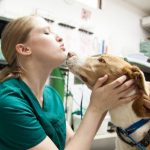Dogs have a way of surprising you even when there was no planned breeding. Your dog may get pregnant without you knowing about it and tiny little puppies may already be well on their way. So how do you know if your precious girl will soon be bringing you more joy?
Here are some pregnant dog symptoms that you must know to address any problems that may occur. The duration of pregnancy is usually about 60 days. However, this number is only an approximation and the real period can be shorter or a little longer depending on the surrounding conditions and other factors.
Pregnant dog symptoms at the early stage
Changes in appetite: Early into the pregnancy, your dog may eat lesser and show signs of decreased appetite. She may also vomit sometimes. These changes in appetite depend on the stage of pregnancy and the changing hormones.
Decreased activity: During the gestation period, your dog will get exhausted easily and spend more time sleeping. You will notice her being less active and playful than she normally is. The energy levels change and she may start to pant even after a short walk. This is because of the change in her hormones that occurs to support the process of embryo production.
Enlarged nipples: Another good indication is the increase in the size of nipples. A female dog’s nipples are normally flat and small. As the pregnancy proceeds, the nipples enlarge and the areolas become rounded. You will also notice them getting slightly darker red in color.
Changes in behavior: Most female dogs’ behavior will change during the pregnancy period. If you notice that your dog suddenly wants to be alone or alternatively wants your attention much more than normal, she may be pregnant.
Pregnant dog symptoms at the middle stage
After one month of pregnancy, your dog will show signs of increased appetite which will return to normal once the pregnancy has ended. A pregnant dog will gain more weight during this period which is one of the clearest signs of pregnancy. You can also check by touching the abdomen area. It will be thick and firm.
Pregnant dog symptoms at the last stage
The abdomen of your dog becomes hard and expands in size depending mainly on the number of puppies she is carrying. Larger dogs have more room and space to carry puppies as compared to smaller dogs. You can also feel puppies’ movement during the last weeks of pregnancy.
Later into the pregnancy, you may also notice a bit of milk leakage. This is called the first milk which is for delivering to the puppies when they are born.
If you are not sure even with all these signs, the easiest approach is to take your dog to the veterinarian and have an ultrasound for accurate results.
Dog false pregnancy
Dog false pregnancy happens when a spayed female dog mimics the physical and behavioral symptoms of pregnancy. She will experience a decreased appetite, exhibit nesting behavior, and mother her toys without actually being pregnant. This happens because of the maternal behavior of the dogs. During the season, pregnancy hormones are at their peak, triggering the symptoms of pregnancy.
These changes will begin about 3-4 weeks after the heat cycle begins. False pregnancy is unpredictable and the symptoms can show up on any female dog whether they were ever mated or not. If your dog has had a false pregnancy before, then there is a probability that she might have it again.
Treatment for false pregnancy in dogs
You don’t have to give any treatment at all because about ninety percent of false pregnancy problems get resolved on their own after a three to four week period from the first sign of false pregnancy. However, there is about a ten percent chance that your dog will develop the psychological effects of mothering behavior that might make her feel bad and sad. She will continue to search for her little puppies and begin to engorge her mammary glands. If your dog exhibits these symptoms, a treatment to restore the hormonal balance becomes necessary.

